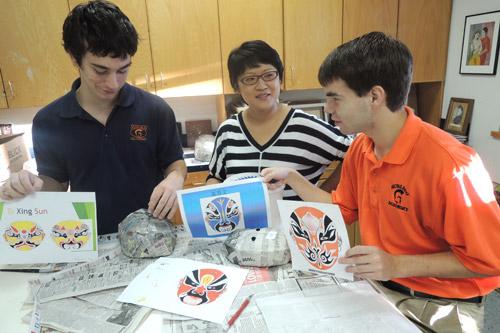

“They were astounded, and in amazement they asked, ‘Are not all these people who are speaking Galileans? Then how does each of us hear them in his own native language?’” Acts 2:7-8
There are a lot of different dialects flying around Subiaco Academy these days with students from China, Korea, Mexico, Vietnam, Germany, Russia and many other points around the globe joining in among the homegrown sons of the Arkansas hills surrounding the all-boys middle and high school academy.
“Foreign language is a natural fit here,” headmaster Matt Stengel said. “It’s not just teaching students how to talk to one another but to appreciate the culture behind it.”
High school students are required to complete two years of foreign language and encouraged to take more. Currently they can choose from Spanish, Mandarin Chinese and German. Stengel said the selection of languages is a process of recognizing trends in the world and building upon opportunity.
“Given China’s status internationally, offering Mandarin makes sense,” he said. “Spanish is a standard wherever you go and offering German fits with our heritage.”
Some students have a deeper personal connection to the languages offered. Patrick Giuliani and Logan Weisenfels are prime examples. The seniors, who hail from Fort Smith and Butte, Mont., respectively, consider being bilingual a nod to their individual heritage.
“My grandfather spoke German fluently, and I always thought it was really cool. He promised to teach me how to speak it, but he died before he got the chance,” Weisenfels said. “As a result, I’ve always wanted to study German.”
Giuliani, whose father is Italian-Canadian and his mother Hispanic, said learning to speak another language also helps him connect on a deeper level with his international classmates.
“Personally, I find it cool to have students here from all over the world,” he said. “You have all of these different ethnicities in class getting accustomed to one another.”
Head of the languages department, Taiwan-born Michelle Chuang leads the three-person department and also teaches several courses. She’s been on staff at the school for 11 years and said the school’s approach to the course material goes beyond syntax and tense to get into the country and people behind the dialect. It’s something to which students have responded, even in the highly challenging Chinese course.
“The first time we tried it, it didn’t fly,” Chuang said. “Then four years ago we tried it again and we had five or six students who have all stayed with it. They have been outstanding ambassadors.”
As well as giving them an appreciation of the immediate world community at the school, students say the focus on language gives them a better view of the big world that lies outside the academy grounds.
“The main reason I’ve kept tabs on language studies is because knowing another language allows you to land certain jobs internationally,” said Jacob Maestri, a senior from Fort Smith. “I’m looking at going into engineering and Spanish, for me, means I can work in any country. I’m a better prospect for jobs because a company wouldn’t have to provide an interpreter.”
International students are required to take English as a Second Language (ESL).
“When the international students get to Subiaco, they already have a solid background in English,” Chuang said. “They don’t particularly like that we have them take English as a Second Language, but for first-year students particularly, it as much a coping mechanism as anything.”
Stengel and Chuang said they would like to revive the Latin component that for years had been a fixture of the foreign language curriculum at Subiaco, both as the language of the Church and the language of certain professions such as medicine. Chuang would also like to expand language courses to middle school students.
Neither could predict what nations would emerge in the future, as China has done, necessitating the addition of another language course, but Stengel did note a sudden infusion of students and faculty from Russia at a time that nation is re-emerging.
“A lot of what we offer in the future depends on the number of students interested and having someone to teach it,” he said. “We’ve suddenly gained three or four students and one faculty member from Russia or of Russian background and while it seems old school to think Russia might be the next big thing, it’s starting to creep back into the spotlight.”
Please read our Comments Policy before posting.
Article comments powered by Disqus A Catholic You Want to Know: John Bui
A Catholic You Want to Know: John Bui
 Businessman’s legacy is suicide prevention foundation
Businessman’s legacy is suicide prevention foundation
 2023 Year in Review: Community, teamwork prove pivotal
2023 Year in Review: Community, teamwork prove pivotal
 Subiaco Academy approves headmaster contract extension
Subiaco Academy approves headmaster contract extension
 Catholic school careers lead teachers, staff into faith
Catholic school careers lead teachers, staff into faith
 'Cabrini' film tells story of saint with great faith
'Cabrini' film tells story of saint with great faith
 Bishop Taylor announces more pastoral appointments
Bishop Taylor announces more pastoral appointments
 Most U.S. Catholics approve of Pope Francis, Pew says
Most U.S. Catholics approve of Pope Francis, Pew says
 Winning directory photo honors Our Lady of Guadalupe
Winning directory photo honors Our Lady of Guadalupe
 St. Joseph a model of solidarity with immigrants
St. Joseph a model of solidarity with immigrants
 Two gifts after Jesus’ death: Virgin Mary and Eucharist
Two gifts after Jesus’ death: Virgin Mary and Eucharist
 Why we have an altar, and not just a communion table
Why we have an altar, and not just a communion table
 Pope: Wars should be resolved through nonviolence
Pope: Wars should be resolved through nonviolence
 Living relationship with Jesus Christ in the Eucharist
Living relationship with Jesus Christ in the Eucharist